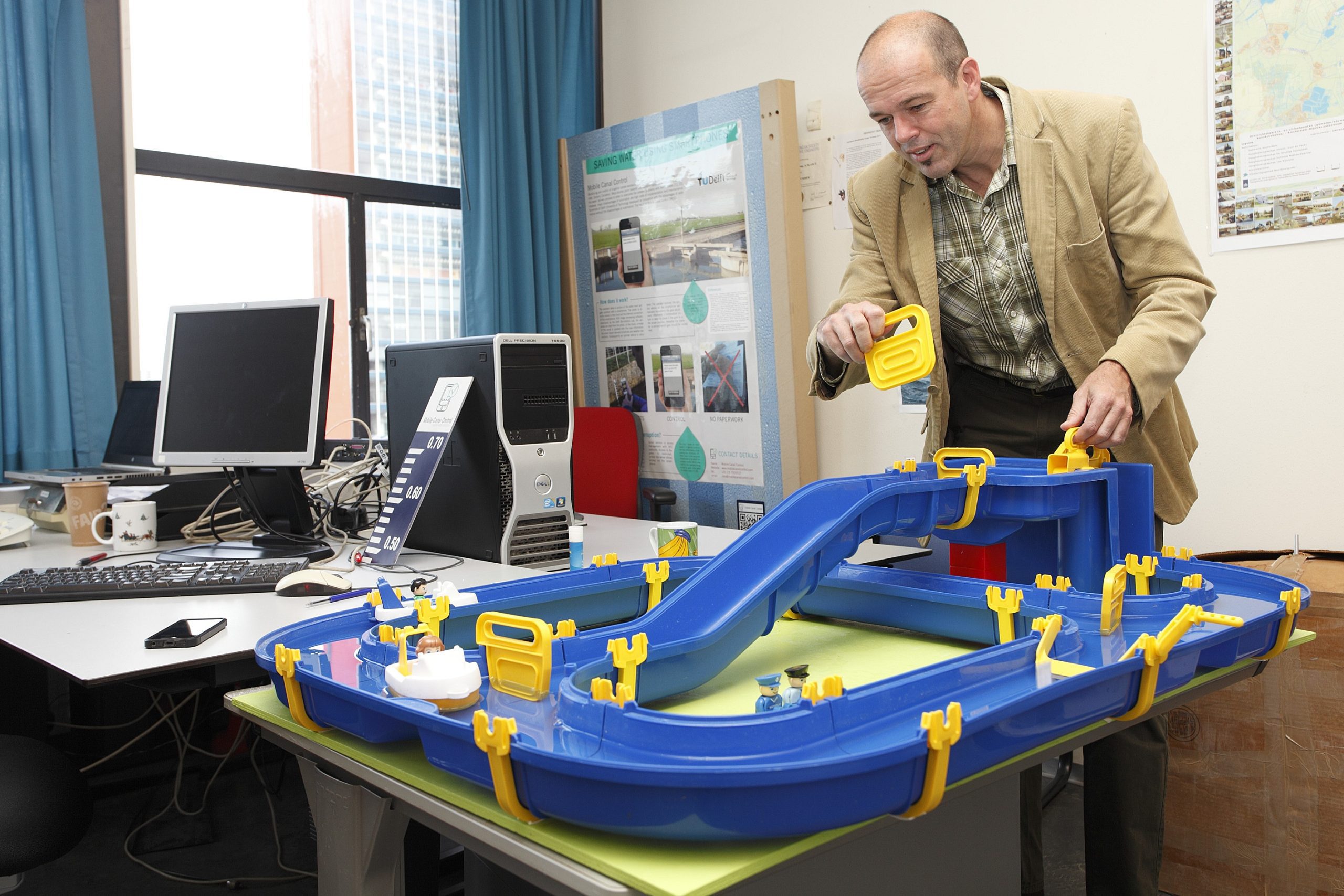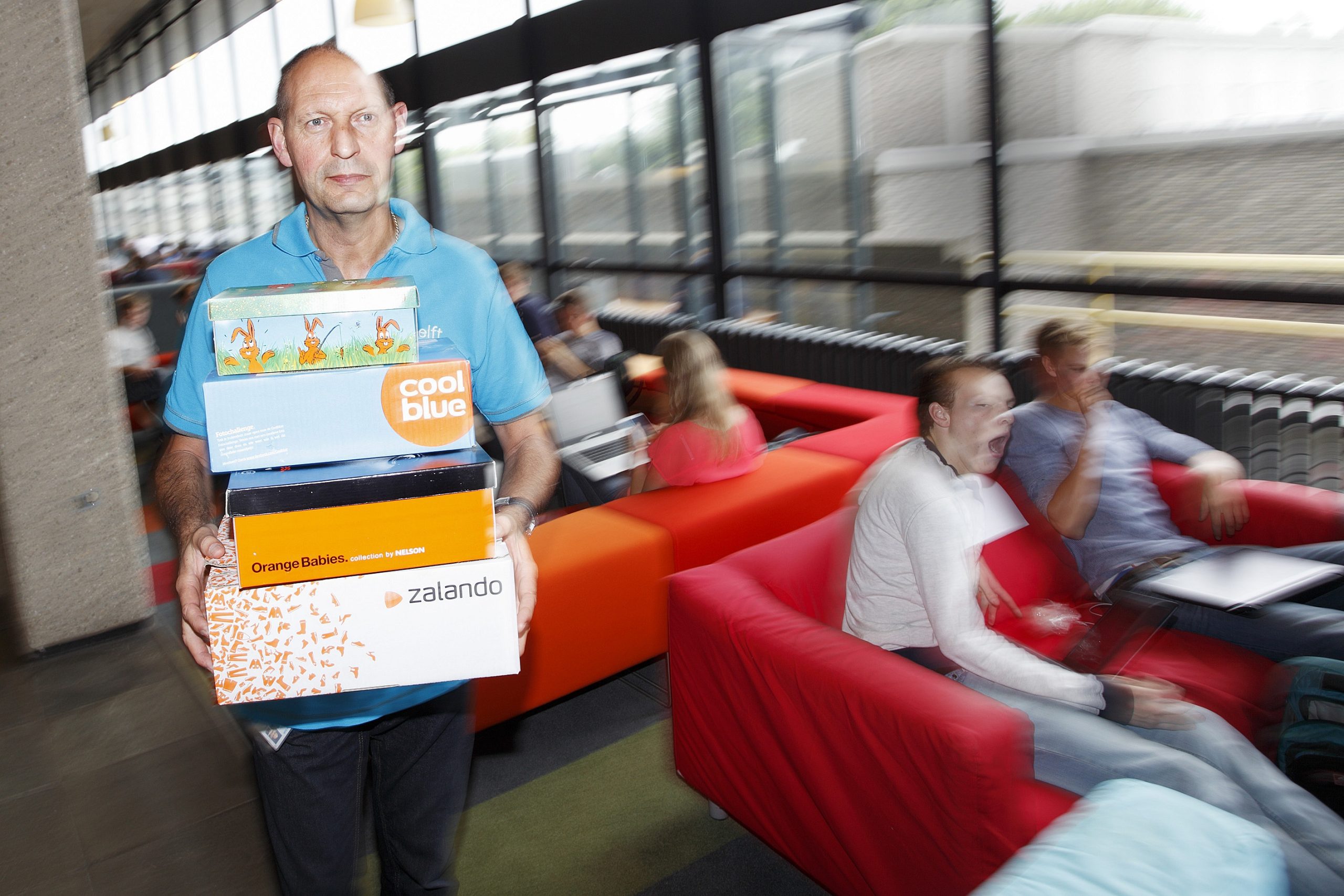Toys, lingerie, fitness equipment – staff in the post room of the faculty of Civil Engineering and Geosciences have had enough. People arrange for all kinds of things to be delivered to the faculty, and send parcels all around the world at TU Delft’s expense. It’s time to take a stand.
“A rowing boat sent from here to China?” Marco Westhoff frowns. “It’s certainly possible. Nothing would surprise me anymore.”
As a member of staff in the department of Facility Management & Real Estate, Westhoff is responsible for the day-to-day running of the post room in the faculty of Civil Engineering and Geosciences. He is responding to an anonymous tip sent to Delta by e-mail. According to Delta’s secret source, CEG staff are in the habit of sending private post at TU Delft’s expense, including – at one point – a rowing boat.
“I hadn’t heard about the rowing boat. I do know that someone once tried to send powdered milk to China. The researcher in question sent a cardboard box showing the logo of the powdered milk producer. So, it was pretty clear what was in that parcel”, Westhoff laughs. “We put this person straight.”
Culture
This anecdote is no exception. Civil Engineering & Geosciences staff have a reputation for using the post room whenever it suits them.
“In CEG, there seems to be a culture of people thinking they can use the post room to send anything they like”, says René van Iwaarden from the central post room. He handles most of the parcels on their journey in or out of the university at some point. “Shall I give you a few examples of the things we see? Clothing, sweets, formula… All paid for with TU Delft money.”
Moreover, the private post that is intercepted probably just represents the tip of the iceberg. “I’m sure a lot slips past us. We only intercept parcels that don’t show a sender. We open them hoping to find out which faculty we can charge.”
The number of suspicious parcels has dropped recently, however. “Word has got out that we’re taking a tough line”, says van Iwaarden.
Rules
A number of torn cardboard boxes are lying in a shelving rack. They come from Industrial Design Engineering, another faculty known for not always sticking to the rules. Van Iwaarden holds up a cardigan. It was on its way to a woman in Ter Apel, who bought it for €10 from an IDE staff member via koopjesnu.nl. The other boxes contain some more clothing and a travel guide.
“People are just flouting the rules”, says van Iwaarden. “The faculties of Architecture & the Built Environment and Aerospace Engineering are the only ones that don’t give us trouble. Which doesn’t necessarily mean that the staff there are angels, of course. Maybe they’re just better at it!” he laughs. “And then of course there’s the student associations, which have been known to play the odd practical joke. They do things like sending each other broken monitors or something equally daft. They don’t mean any harm by it.”
Recently, it has become more difficult for CEG staff to send private parcels. Last summer Westhoff e-mailed a letter to all staff on behalf of the faculty. The letter informed them of the rules and warned them that security would be tightened in order to stop people from abusing the system. Westhoff: “We are actively tackling the ingrained culture (that anything goes in the post room of CEG –ed.), and are managing to reverse it.”
Pleasure parcels
Parcels are now only dispatched “if they are open when presented to the logistics desk, so that the contents and postage method can be checked”.
Another new rule concerns incoming post. “As of now, parcels that are obviously intended for private use will not be accepted”, it says in the letter.
Since the advent of online shopping, staff working on the CEG logistics desk, which controls the post room, have seen a huge rise in the proportion of private parcels. It’s only an estimate and there are no hard figures. The faculty intends to put an end to this practice, whatever it takes.
“We call them pleasure parcels”, continues Westhoff. He retrieves a document on his computer. “Look: this is a list of dozens of items that we’ve received over the past three months. They vary from lingerie and clothing from H&M, to a tent, hammocks and a pram.”
A fruit extractor that turned up recently does not appear on the pleasure parcel list. “I saw it in the lab the other day. It was being used for research into the perishability of food.”
Heavy workload
People probably don’t think they’re doing anything wrong. A lot of researchers work long hours and are not at home when parcels are delivered. Having them sent to their work address seems like a good alternative.
“I can appreciate their problem”, says Westhoff. “People need a place at work where stuff can be delivered. It would be great if TU Delft could set up a special delivery room for staff.”
But in the meantime, the CEG post room is not the place for private parcels. They are unreasonably increasing the workload. “On average, we take delivery of eleven hundred parcels per month. It can be quite difficult trying work out where they’re all supposed to go.”
A lot of the post is delivered to the wrong address. A parcel may be intended for another part of the university, but accidentally get sent to the billing address instead of the delivery address. CEG parcel service staff face an added burden from the TU Delft financial administration centre, which is based in the faculty building.
In addition, their workplace functions as the delivery address for the Dreamhall, where students work on hundreds of projects, such as the Nuna solar-powered car, the Wasub submarine and the DUT racing car. These students order a lot via online shops.
Liability
In addition to the added workload and strain on storage space, there is also the question of liability. “This summer, someone came to us up in arms because we’d lost his iPad”, Westhoff says. “I was held responsible. But FedEx had delivered the parcel somewhere else. Fortunately, we were able to trace it through our registration system. I don’t really understand how people can arrange to have things delivered – iPads, cameras, shoes – and then hold the logistics desk responsible when they get lost.”
Member of service staff Wim Sträter is pleased that Westhoff has decided to take action. “Trying to work out who all these parcels are for means extra work for us. I once said as much to a professor who’d ordered clothes for his wife to be delivered here.”
Sträter currently has a 5-kilo weight for a dumb-bell sitting on the shelf for unclaimed property. “I simply cannot believe that people have this sort of stuff delivered here. I’ve got exercise equipment at home too, but this just isn’t on. I sent an e-mail to the person who ordered it a month ago, but he never replied.”
Hula hoops
Not everyone is happy about the new rules. Tim van Emmerik has concerns. “Over the past few years, I’ve ordered hula hoops, a life buoy, a rubber dinghy and garden hoses”, says the PhD student from the Water Resource Management research group. “I needed them all for my research. An untrained eye just can’t tell what is meant for research and what isn’t. If I order items like these in future, they’ll probably get sent back.”
Van Emmerik is right to be worried. “We’d certainly send a hula hoop back”, Sträter says when asked. And what about an inflatable paddling pool? “Ah! An inflatable paddling pool!” says Sträter with a huge smile on his face. “Now that I’d accept, because that could be used for water research.”
Westhoff doesn’t think that well-intentioned researchers will be seriously affected by the tougher rules. Parcels ordered via the faculty secretarial department show the number of the purchase order. These are clearly official TU Delft parcels and will always be accepted.
Alarm bells
“And if a researcher orders something on his/her own initiative (i.e. without going through the secretarial department –ed.) and thinks that we might suspect it of being for private use, he/she should simply warn the logistics desk in advance. We won’t argue with researchers. They are not accountable to us. They’re the ones who know exactly which paddling pool they need for their project.”
Just a few days after the interview with Westhoff, however, we see an example of how things can go wrong. A parcel from Wehkamp has been erroneously returned. It had been ordered by students in the Dreamhall, for the Ocean Cleanup project and probably contained T-shirts or other items of clothing needed for their project.





Comments are closed.